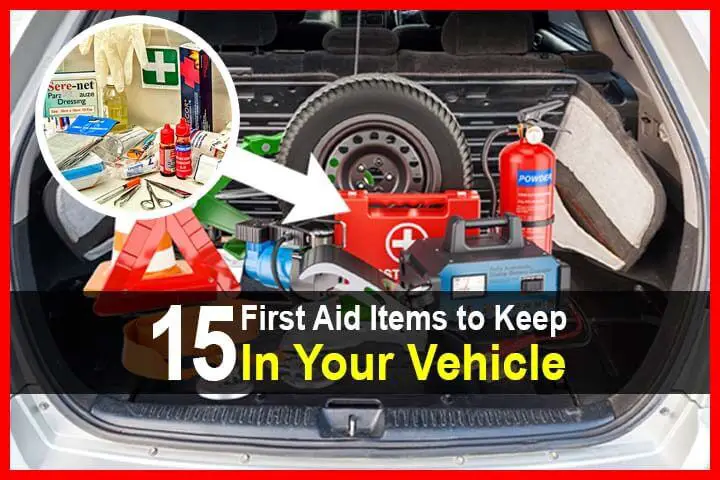Every time you get behind the wheel, there’s a risk of getting into an accident. It doesn’t matter if it’s a minor fender bender or a serious collision, you can never know what to expect. As a homesteader, you know preparedness is key.
That’s why it’s important to always be prepared for the worst by keeping a first aid kit in your vehicle. And it’s not just about car accidents, either – you never know when you’ll encounter a food you didn’t know you were allergic to, be stung by a bee, or sprain an ankle while walking your dog at the park.
While no one wants to imagine themselves in an emergency situation, having these first aid items in your car could be the difference between life and death.
Why Should You Keep First Aid Items in Your Vehicle?
No one wants to think about getting into a car accident or experiencing a medical emergency on the road, but unfortunately, these situations can happen to anyone at any time. That’s why it’s essential to be prepared and keep first aid items in your vehicle.
Car accidents are more common than we would like to admit, and even a minor collision could result in injuries. Having a first aid kit in your car can ensure that you are not left helpless while waiting for medical assistance.
You can take immediate action to relieve pain or stop bleeding until an ambulance arrives. If you travel with your family or friends, you’ll want to make sure everyone is safe and taken care of during an emergency.
Apart from accidents, you may encounter health challenges while on the road. Someone in your car may suddenly feel dizzy or faint; have an asthma attack or allergic reaction to food or pollen. You may also come across someone else who needs help while driving. In that situation, you can offer immediate attention by using the first aid kit from your vehicle.
In addition to the advantages mentioned above, keeping a first aid kit in your car can give you peace of mind. When you’re driving on a long journey or heading into unfamiliar territory, carrying a first aid kit can provide you with a greater sense of security. Knowing that you are prepared for any medical emergency that might arise can help reduce anxiety and stress levels.
Depending on where you live, you may be legally required to carry a first aid kit in your vehicle. For instance, several states in the United States require commercial vehicles, such as trucks and buses, to have a first aid kit on board.
Even if you’re not required to carry one, it’s still an excellent idea to keep a selection of first aid items in your vehicle for the reasons outlined above.
15 First Aid Items to Keep In Your Vehicle
Before you hit the road on your next excursion, whether it’s across town or across the country, make sure you have these first aid items packed and ready to go in your car kit.
1. Bandages and Gauze
The most common first-aid items you need to keep in your vehicle are bandages and dressings. They can be used to cover cuts and scrapes, and stop bleeding.
You can consider keeping a variety of sizes and shapes, including adhesive strips, sterile gauze pads, and non-stick pads. It is also important to keep a roll of medical tape to secure the dressings.
2. Instant Cold and Hot Packs
Instant cold and hot packs are also essential items that you should keep in your vehicle’s first-aid kit. Cold packs are useful in reducing swelling and relieving pain caused by minor injuries, while hot packs can help to alleviate muscle soreness, stiffness or other traumatic injuries that require heat therapy.
3. Disposable Gloves
Disposable gloves can help to prevent the transmission of disease, and they are also useful when administering first aid to someone. You may use them as an additional protection against cuts, infections, and other contaminants.
4. Scissors
A pair of scissors can come in handy when administering first aid, especially when you need to cut tape, gauze, clothing, or other materials during an emergency. Choose sharp, sturdy scissors that can cut through different materials, including thick fabric or leather.
5. Cotton Balls/Q Tips
Cotton balls and Q-tips are excellent tools for administering medication, cleaning wounds, or applying ointment. They are also very effective in removing dirt, debris, or other foreign bodies from the skin’s surface.
6. Sterile Eyewash
If you have ever driven through a dusty or windy area, or experienced eye irritation caused by pollen, you know how uncomfortable it can be. Sterile eyewash can help to rinse out any dirt or debris that may have entered your eyes, thus ensuring eye safety and hygiene.
7. Tweezers
Tweezers are a handy tool to have in your first aid kit. They can help you remove tiny objects such as thorns, splinters, or glass from the skin’s surface. You can also use them to remove bee stingers, ticks, and other foreign objects.
8. Hand Sanitizer
Hand sanitizer is an essential item that should never be overlooked in your first aid kit. It can help you clean your hands, preventing germs and bacteria from spreading. It’s important to choose a hand sanitizer with a minimum of 60% alcohol content.
9. Thermometers
A thermometer can help you measure the temperature of someone suffering from a fever. It can help you determine the severity of an illness and decide whether or not to seek immediate medical attention.
10. Antihistamines and an Epi Pen
Allergic reactions often occur while on the road. Keep a supply of antihistamines and an EpiPen in your first aid kit to treat any unexpected allergies. EpiPens are especially important for individuals with severe allergies.
11. Pain Relievers
Pain relievers will help alleviate pain that can occur due to various injuries or illnesses. Over-the-counter pain relievers such as ibuprofen, aspirin, and Tylenol work well to alleviate pain.
12. Antidiarrheal Medication
Diarrhea can strike at any time, especially during long drives when you’re eating foods that your GI tract just isn’t familiar with. Keeping antidiarrheal medication such as loperamide in your first aid kit can help alleviate discomfort and help you get back on the road quickly.
13. Aloe Vera and Sunscreen
Sunburn is one of the most common injuries that people experience when driving or spending time outside. Aloe vera gel is a great natural remedy for sunburns as it has anti-inflammatory properties. Also, make sure to keep sunscreen in your first aid kit to protect your skin from harmful UV rays.
14. Antiseptic Wipes
Using antiseptic wipes to clean wounds is an effective way to prevent infections. Keep a supply of antiseptic wipes in your first aid kit to ensure that any cuts or scrapes are taken care of properly.
15. Antibiotic Ointment
Antibiotic ointments such as Neosporin and Polysporin are great to have on hand as they help prevent infection and promote healing. Whenever you experience an injury, use an antibiotic ointment to prevent any potential infections – just in case.
Final Thoughts
Remember, accidents happen when you least expect them, and they occur when you’re least prepared. Having the right first aid items in your vehicle could help you save someone’s life, including your own.
So, take a few minutes to organize your car first aid kit and make its travel-friendly. Check the contents regularly, and replace items that have expired, to ensure you are always ready for any emergency situation. Don’t drive without them!

Read the full article here


